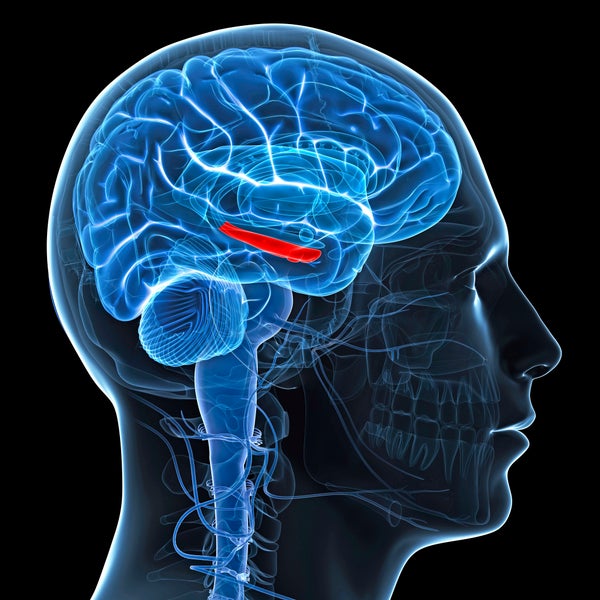The hippocampus is a small curl of brain, which nests beneath each temple. It plays a crucial role in memory formation, taking our experiences and interactions and setting them in proverbial stone by creating new connections among neurons.
A report published on June 27 in Science reveals how the hippocampus learns and hard wires certain experiences into memory. The authors show that following a particular behavior, the hippocampus replays that behavior repeatedly until it is internalized. They also report on how the hippocampus tracks our brain’s decision-making centers to remember our past choices.
Previous research has shown that the rodent hippocampus replays or revisits past experiences during sleep or periods of rest. While a rat navigates a maze, for example, so-called place cells are activated and help the animal track its position. Following their journey through the maze, those same cells are reactivated in the exact same pattern. What previously happened is mentally replayed again.
On supporting science journalism
If you're enjoying this article, consider supporting our award-winning journalism by subscribing. By purchasing a subscription you are helping to ensure the future of impactful stories about the discoveries and ideas shaping our world today.
The authors of the new study were curious whether this phenomenon only applies to previous encounters with a particular location or if perhaps this hippocampal replay also applies to memory more generally, including mental and nonspatial memories.
It turns out it does.
In the study, 33 participants were presented with a series of images containing both a face and a house. They had to judge the age of either one or the other. If during the second trial, the age of the selected option remained the same, the judged category also did not change in the subsequent trial. If the ages differed, the judged category flipped to the other option in the next round.
While engaged in these tasks, the subjects underwent functional magnetic resonance imaging (fMRI), which allows researchers to monitor brain metabolic activity related to areas of the brain that are active at a given time. In this case, the imaging allowed the authors to view the patterns of activity in different brain regions before, during and after the decision task.
Following 40 minutes of this exercise, participants underwent brain scanning at rest for five minutes. The fMRI patterns recorded in the hippocampus at rest seemed to re-create snippets of activity that occurred during the decision-making task. And they did so again and again. It is as if the brain keeps rewinding a movie scene until it can recite it by heart.
Further, the new research found that people who had more replay in their hippocampus exhibited activity that was more similar to the task in a brain region called the orbitofrontal cortex, an area involved in decision-making. “We found the fact that [activity] in the orbitofrontal cortex relates to replay in the hippocampus really amazing,” says Nicolas Schuck, lead author of the paper and a neuroscientist at the Max Planck Institute for Human Development in Berlin. He feels the findings suggest that replay of task and decision sequences in the resting hippocampus helps train the cortex to better solve similar tasks in the future.
According to the paper’s senior author, Princeton University neuroscientist Yael Niv, the new results suggest that replay in the hippocampus is not only critical to forming memories but also to learning which of our behaviors and decisions are most effective at accomplishing a goal and so should be repeated
Thackery Brown, a professor in the School of Psychology at the Georgia Institute of Technology, who was not involved in the study, finds the new work critical in demonstrating that the hippocampus supports replay of not just navigation and spatial experiences but also decision-making. “Although spatial navigation is essential for daily life in both humans and animals,” he explains, “we often remember sequences of experiences that take place over time as well as space. The memory of our child’s birthday party, for example, may involve many events unfolding over time at one location.” Once we are back home on the couch, the hippocampus, it seems, may binge-watch the party on repeat, committing it to memory.
The long-term fate of memories depends on connections between hippocampal neurons and those in the high-level cognitive-processing regions of the cortex, as the new work shows. Brown believes hippocampal activity, in particular the replay described by Schuck and Niv, helps strengthen those bonds so that they provide long-lasting traces we can access, using a variety of memory cues. “This type of ‘neural rehearsal’ could encourage stronger connections between neurons that code for the memory,” he says.
It is well known that the brain gets busy when we think we’re giving it a rest during sleep or meditation. The new findings may be related to the memory consolidation we undergo while snoring away. Schuck explains that the hippocampal replay during sleep probably helps form and store memories. One open question is whether a role for replay exists during dreaming as well: the twisting of recent events into those phantasmagoric nocturnal narratives may serve to process and store—or toss out—our recent experiences.
Schuck and Niv plan to use their brain-analysis technique to explore how planning tasks may be related to replay. They want to investigate whether effective planning entails retrieving and replaying past experiences to better optimize the way we approach the future.
“We think our new methods will be a door opener to look in much more detail at replay in humans,” Schuck says. “We hope that our new methods pave the way to look at these things in the future.”
